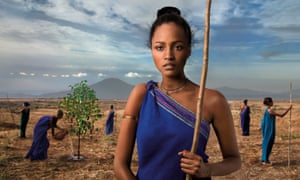Shipping, the servant of global trade, has a massive environmental footprint. Typically 90% of what we consume in the UK has been imported; most is shipped. We’re not just talking consumer goods – TVs, iPhones, trainers – but also dry bulk goods, from grain to timber and coal for power stations. The industry is responsible for 1bn tonnes of greenhouse gas emissions per year (similar to the emissions of Germany).
Still, shipping is better than air freight. A Defra study concludes that 2 tonnes of freight carried for 5,000km by a small container ship creates 150kg of CO2e (a measure of relative global warming potential) compared to 6,605kg of CO2e if the freight is carried by plane for the same distance. A clear difference.
It is unlikely that any importer – and therefore any consumer – can guarantee a “small” ship (the vogue is for huge cargo ships, which use more fuel). Nor can we confirm the route: some shipping lines avoid emission-control areas established in an effort to combat sulphur emissions.
There are greener ships. In 2009, a solar-powered container ship made its maiden voyage. But given the enormous capital investment tied up in a ship – and that there’s a five-year lead time on cleaner, greener versions – owners are loathe to scrap old ships.
Still, between 2007 and 2012 we saw a dip in emissions: after the recession containers slowed down to save on fuel. Pre-economic crash a cargo ship typically travelled at 24 knots, and post crash 16 knots. But now, with economic recovery, it’s full steam ahead. Greenhouse gas emissions from shipping might rise by 250% by 2050.
There’s a massive social justice story emerging here, too. The 2006 Maritime Labour Convention established universal rights for seafarers, but they remain among the most vulnerable group of workers. There’s not much access to lawyers and doctors at sea and the practice of registering ships under flag states with lower human-rights standards persists.
For something so important to us (for a surprisingly thrilling rundown of containers, read The Box by Marc Levinson), it’s unbelievable that these ships are such shadowy facilitators of our consumerist lives. Imported goods, therefore, have a gap in their supply chain. We all need to engage not just with who produces our goods (the mantra of fairly traded goods) but also who brought them to us.
Green crush

Photographer Steve McCurry captures ‘Earth Defenders’ for the 2015 calendar from coffee brand Lavazza and Slow Food. Each picture depicts a community defending land and a way of food production, from the women on the Fadiouth Island in Senegal who produce couscous to those in the Kafa region of Ethiopia producing coffee (pictured) and the schoolchildren of coffee farmers in Tanzania. ‘Recognise the value of food,’ says Slow Food founder Carlo Petrini. ‘It is not sustainable to consume food recklessly, without looking at what lies behind the product. We can no longer tolerate that communities in Africa are denied their own food sovereignty.’ All of the proceeds go to create 10,000 food gardens in African schools and villages by the end of 2016. calendar2015.lavazza.com
Greenspeak: airpocalypse {a’püklīps} noun
Used by Beijing residents to describe air quality. In China air pollution is thought to kill 350,000 a year. It’s spawned airpocalypse products, including a beer the price of which is linked to the pollution index.
78 days to save the Earth …
… we’re all in. Are you? On November 4, a day after the presidential election, the US will formally withdraw from the Paris agreement on constraining global heating. It’s urgent that we tell the world what this means, and the Guardian is pulling out all the stops to do so. Will you help us by supporting our journalism?
Millions are flocking to the Guardian every day. Financial support from our readers is crucial in enabling us to produce open, fearless, independent reporting that addresses the climate emergency. It helps sustain the freedom we have to present the facts comprehensively, explain the details as they unfold, and interrogate the decisions made.
The Guardian recognises the climate emergency as the defining issue of our times. That’s why we have pledged to give climate change, wildlife extinction and pollution the sustained attention and prominence they demand, as a core part of our journalism.
At this pivotal moment for our planet, our independence enables us to always inform readers about threats, consequences and solutions based on scientific fact, not political prejudice or business interests. This makes us different. And we are equally determined to practice what we preach: we have divested from the oil and gas sectors, renounced fossil fuel advertising and committed to achieving carbon neutrality by 2030.
We believe everyone deserves access to information that is fact-checked, and analysis that has authority and integrity. That’s why, unlike many others, we made a choice: to keep Guardian reporting open for all, regardless of where they live or what they can afford to pay. Our work would not be possible without our readers, who now support our work from 180 countries around the world.
Every reader contribution, however big or small, is so valuable for our future. Support the Guardian fr
